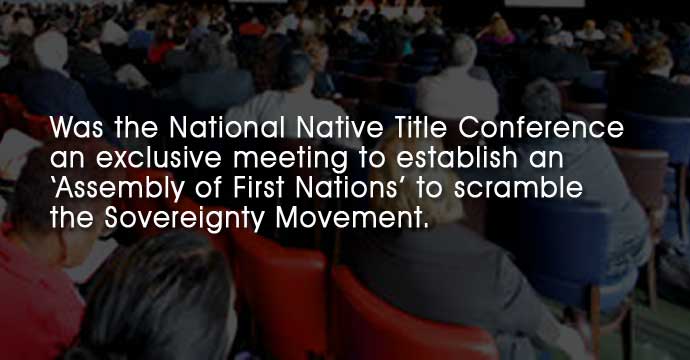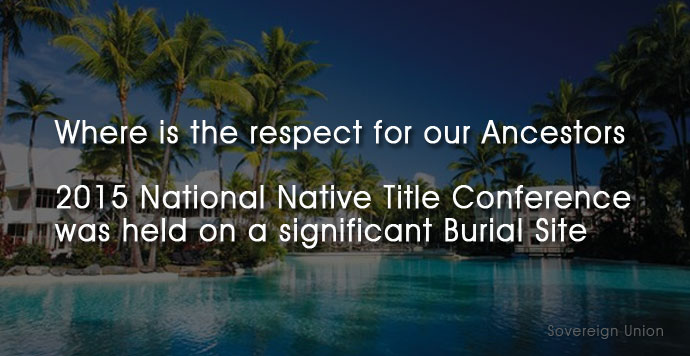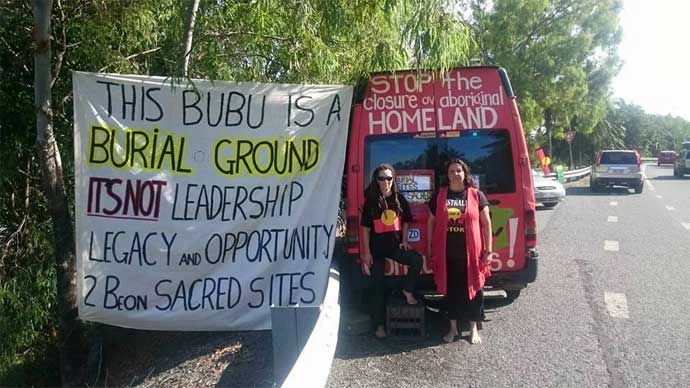Government's establishment of First Nations Assembly at Native Title Conference


17 June 2015
Ghillar, Michael Anderson, Convenor of the Sovereign Union, co-founder of the Aboriginal Embassy and Head of State of the Euahlayi Peoples Republic said today from Geneva, where he is attending the 1979 and 1981 UN First Delegates Symposium, with topics including 'Decolonisation' and 'Permanent Sovereignty over Natural Resources':
Re government's establishment of First Nations Assembly at Native Title Conference
 The 2015 National Native Title Conference at the Sheraton Mirage at Jabukanji (Port Douglas) was built on a known burial site and it is believed that human remains were unearthed during its construction and were not reburied with respect. Now AIATSIS, a peak government funded First Nations organisation has held a treacherous meeting at this grossly abused site with an agenda item: "how to protect Sacred sites" and a hidden agenda item to rock the growing Sovereignty movement.
The 2015 National Native Title Conference at the Sheraton Mirage at Jabukanji (Port Douglas) was built on a known burial site and it is believed that human remains were unearthed during its construction and were not reburied with respect. Now AIATSIS, a peak government funded First Nations organisation has held a treacherous meeting at this grossly abused site with an agenda item: "how to protect Sacred sites" and a hidden agenda item to rock the growing Sovereignty movement.

Prof Mick Dodson (pictured), Mr Russell Taylor, Ms Michelle Patterson, Mr Kado Muir, Ms Louise Anderson, Dr Kingsley Palmer, Mr Robert Blowes, Ms Natalie Rotumah, Mr Brian Wyatt CEO, Mr Andrew Davitt,
2015 National Native Title conference
There are warning bells ringing across the continent regarding this week's proposed Assembly of First Nations establishment meeting in Port Douglas at the National Native Title conference hosted by the Australian Institute of Aboriginal and Torres Strait Islander Studies (AIATSIS).
Participants to the exclusive meeting to establish an Assembly of First Nations were invited by the Australian Human Rights Commission, under the auspices of the AIATSIS National Native Title Conference Agenda as late as 3 June 2015. It appears to be a very subtle way of diverting attention away from the real sovereignty of our Peoples. This way, if sovereignty is not part of the underpinning factors, then it is just another treacherous act on the part of the organisers to scramble the Sovereignty Movement with more promises.
I have been informed that:
The Agenda of this Meeting refers to several significant decisions that it appears it is the intention of the meeting to vote upon or endorse, including the Charter declaring the Assembly of First Nations is established. The Working Group has not established processes which allow for First Nations to engage with these decisions prior to their adoption. In particular, we insist that it is solely the right of each Nation to decide who will represent them at such a meeting. We do not recognise the legitimacy of the process of appointed representatives in absence of our involvement, regardless as to whether that person belongs to our Nation or not.
In hosting this meeting within the exclusivity of the National Native Title Conference under the auspices of AIATSIS, the Working Group has privileged the participation of Native Title proponents throughout this process. This is unacceptable. Neither Native Title holders, nor Prescribed Body Corporates, represent the interests of all First Nations Peoples. Indeed, given the difficulties of getting acceptable Native Title outcomes in south-eastern Australia, it can only be seen as a discriminatory approach that is exclusive rather than inclusive. It privileges decision-making about our cultural rights through the exploitation of our economic inequalities. We strongly object to AIATSIS's implicit support of this process.
So it was with concern and disappointment that this invitation was issued to First Nations' people barely two weeks from the date of the meeting at one of the most costly venues for travel and accommodation in the country: one that would clearly be prohibitive for many. We note that the Working Group has not facilitated attendance via online teleconferencing, which could at least have alleviated this second concern, but this alone would not have enabled the local engagement that is essential to legitimising the whole process in accordance with the Working Group's stated obligations to facilitate engagement and contribution from Aboriginal and Torres Strait Islander peoples.
We see this top-down approach to establishing the Assembly of First Nations as a poor demonstration of the Working Group's stated principles to ensure the cooperative and respectful relations upon which the Assembly must be based. The absence of checks and balances under which the Working Group operates to address issues concomitant with its deliberations, such as conflicts of interest, is alarming. ...
We do not expect that the items on the agenda to be dealt with as anything other than discussion topics, and that the meeting will devise a more appropriate process through which First Nations can decide how they will respond, and who will represent them, at a meeting to be held at a future time in a more economically and socially convenient and facilitated location, and with adequate notice to enable people to pull together the resources required to make attendance possible.
We await news of outcomes, but question whether this is yet another way for the Commonwealth Government to try and derail the Sovereignty Movement and decolonisation.

Image: Prue Barratt and Shanelle Young at Port Douglas outside the Conference.
Postscript: I'm attaching the link to IndigenousX: Constitutional Recognition Survey as a follow up to my discussion paper [15 June 2015] - Decolonisation: to be or not to be included in the Constitution? Thus survey exposes as false the Commonwealth Government's assertion that 70-75% of Aboriginal and Torres Strait Islanders are in support of the Recognise campaign. We are grateful to Celeste Liddle for organising this survey, which demonstrates that mainstream media's spin on this topic is deceitful and engineered to generate a false notion that we want to be part of the coloniser's Constitution and to be governed by a system that works to ensure our demise, take our land and usurp our Sovereignty.
" ... IndigenousX decided to release their own survey to the community on the topic of Constitutional Recognition. IndigenousX is uniquely positioned in Social Media as one of few Indigenous owned and operated online spaces that actively engages with many sides of the political spectrum, whether they are seen as 'mainstream' or not. In the 1.5 weeks this survey has been available for responses, 827 community members have responded. This survey was distributed online, via social media channels, and was shared widely. The results it has reaped have been telling.
We will investigate the question responses one by one in the interest of transparency ... "

Banner source: AIATSIS website
Convenor of Sovereign Union of First Nations and Peoples in Australia
and Head of State of the Euahlayi Peoples Republic
Mogila Station, Goodooga NSW 2838
ghillar29@gmail.com, 0427 292 492 www.sovereignunion.mobi

